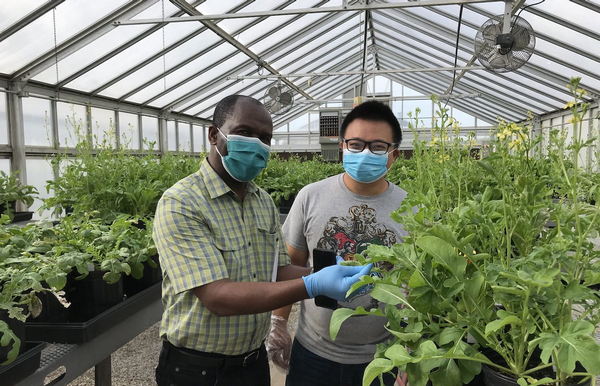Bowery Farming, the national vertical farming giant, has a new agreement with the University of Arkansas System Division of Agriculture to support research for developing spinach varieties that are bred for high-quality indoor production and to thrive in Bowery’s proprietary growing system.
Scientists with the Arkansas Agricultural Experiment Station, the research arm of the Division of Agriculture, are conducting the research in partnership with scientists at Bowery’s research and development facilities. Bowery Farming states it is the largest vertical farming company in the United States in terms of retail footprint.

Newton Kalengamaliro, Senior agricultural scientist with Bowery Farming Inc., and Haizheng Xiong, Ph.D., program associate with the Arkansas Agricultural Experiment Station
Bowery Farming sells pesticide-free leafy greens and herbs at more than 1,100 U.S. grocery stores and major e-commerce platforms, including Walmart and Whole Foods Market. This year, the New York City-based company launched two varieties of strawberries, offered in their Strawberry Discovery Duopack. Bowery Farming is also expanding its geographic reach across the U.S. with a new indoor “smart farm” in Bethlehem, Pennsylvania, with robotics, artificial intelligence, and other technology to manage the farm systems.
Bowery Farming will soon launch farms in the Atlanta and Dallas metro areas
“The agreement between Bowery Farming and the Division of Agriculture highlights our dedication to improving modern agriculture using advanced breeding technologies,” said Jean-François Meullenet, senior associate vice president for agriculture research and director of the Arkansas Agricultural Experiment Station. “Collaborations like this exemplify the kind of public-private research partnerships the Arkansas Agricultural Experiment Station has conducted for decades as part of our land-grant mission.”
The renewable agreement with Bowery Farming supports the evaluation of high-yield breeding lines and studies that identify genetic markers in spinach for resistance to waterborne pathogens, such as Pythium, as well as other beneficial traits for growing spinach indoors.
Pythium is a fungus-like pathogen that can cause rot and damping-off, destructive diseases in both field and hydroponics production. “In Arkansas, we are very good with our spinach program, going over 50 years now,” said Ainong Shi, associate professor and vegetable breeder for the department of horticulture. Shi said the Division of Agriculture’s long history and expertise in spinach breeding led to initial contact with Bowery Farming in 2020.
Jim Correll, Distinguished Professor of entomology and plant pathology, is behind much of the spinach research with the experiment station and will work with Shi on the Pythium-resistance project. Correll successfully developed a spinach line resistant to white rust in previous research and has been developing molecular markers in spinach with a focus on Downey mildew-resistant genes.
Haizheng Xiong, a program associate in the department of horticulture who is also on Shi’s team, said they select promising spinach lines from lab and greenhouse studies and then outdoor test plots before evaluating them for indoor hydroponics. In addition to disease resistance, smooth leaf texture is a desired trait for easier washing, Xiong said. Other desired traits include taste, color, nutritional components, leaf shape, growth speed and yield, Shi noted.
A large part of the research for Xiong and Shi includes molecular breeding — genetic mapping and genome selection of different spinach and arugula lines. Field studies are conducted at the Milo J. Shult Agricultural Research and Extension Center in Fayetteville and the Vegetable Research Station near Kibler. With information from lab and field studies, the researchers expect to get a more detailed genetic map of the plants and find a Pythium-resistant line.
Shi noted that molecular breeding includes marker-assisted selection and genomic selection. This breeding process is not considered gene-editing or genome-editing and does not result in genetically modified organisms (GMOs), he said.
Hydroponic testing
The screening of spinach and arugula lines in indoor hydroponic systems will be carried out by Ryan Dickson, assistant professor of greenhouse and controlled-environment horticulture.
“Pythium is one of the main factors limiting the production of spinach hydroponically, and targeted breeding efforts for Pythium resistance as well as better performance in indoor farming systems is a logical next step,” Dickson said. “Identifying spinach and arugula lines with true resistance to Pythium would be a huge achievement and game-changer for the industry.”
Bowery Farming and the Division of Agriculture have a framework in place to deal with any inventions that result from this research.
Dickson’s program conducts applied research for greenhouse and controlled-environment industries, with a major focus on improving root zone health for crops grown hydroponically and in soilless growing media. In addition to research on mitigating water-borne diseases, like Pythium, Dickson’s team conducts research related to root zone nutrient and pH management, irrigation and water quality, and evaluation of new soilless and sustainable growing media.
Source: aaes.uada.edu
